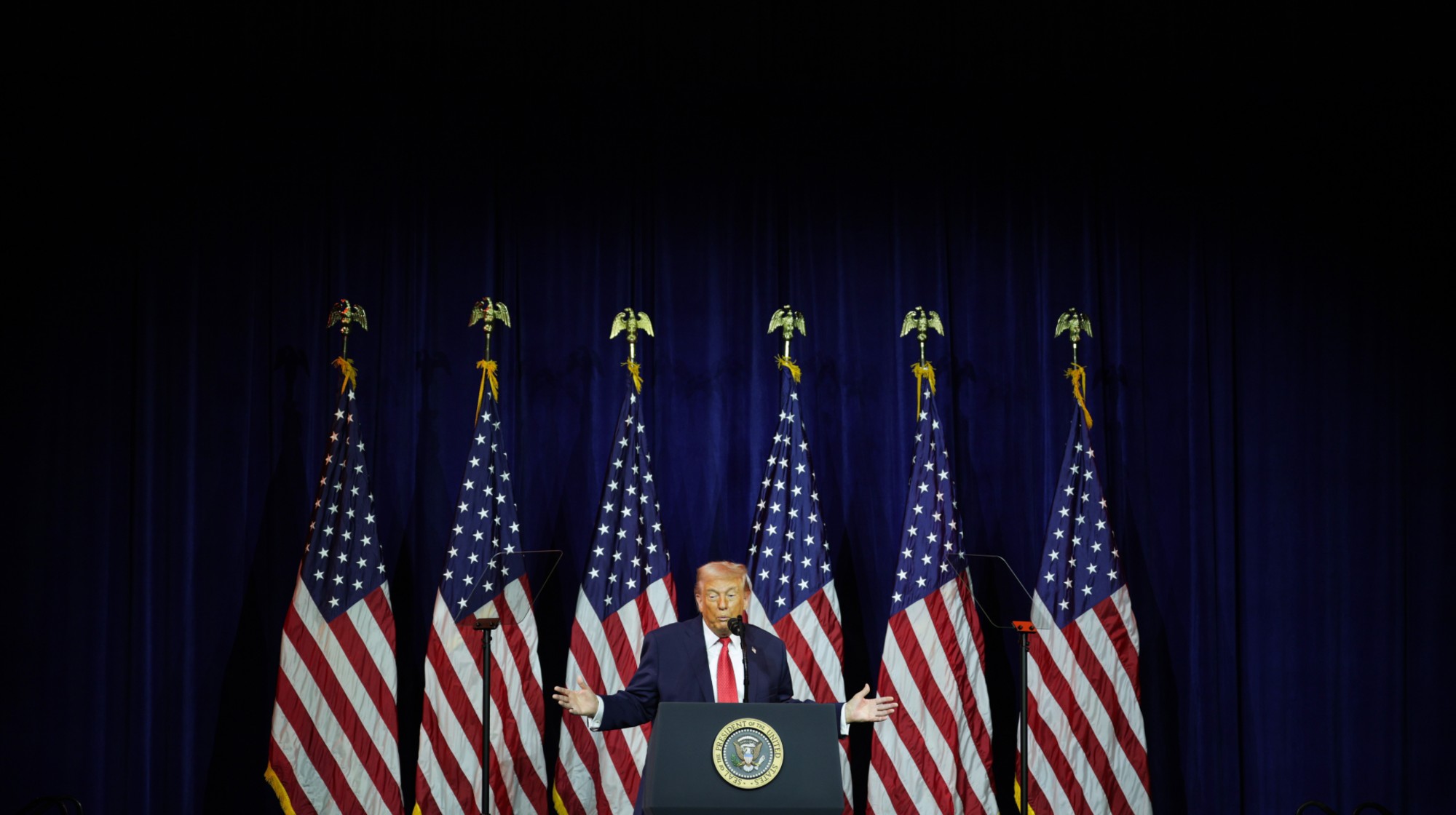How history will view Trump's impeachment
What will this moment look like in 20 years' time?


A free daily email with the biggest news stories of the day – and the best features from TheWeek.com
You are now subscribed
Your newsletter sign-up was successful
There are two ways of looking at history. One is idealistic: "The arc of history is long, but it bends toward justice." The other is grimly realistic, and maybe a touch cynical: "History is written by the winners."
The impeachment of President Donald Trump might be a good test case for which of these outlooks is more correct. He is the "winner" of this impeachment process after all — acquitted of charges by a (mostly) partisan Senate, and stands a reasonable chance of winning re-election in November.
On the other hand, it is difficult to say that justice has been done. Even Republicans who voted for acquittal — Sens. Susan Collins of Maine, Marco Rubio of Florida, and Lamar Alexander of Tennessee among them — proclaimed publicly that Trump's efforts to subvert the 2020 election were "inappropriate" and "wrong." If justice ultimately steers the judgments of history, in 20 years time we will probably see Trump's victory this week as a painful setback for the rule of law in America.
The Week
Escape your echo chamber. Get the facts behind the news, plus analysis from multiple perspectives.

Sign up for The Week's Free Newsletters
From our morning news briefing to a weekly Good News Newsletter, get the best of The Week delivered directly to your inbox.
From our morning news briefing to a weekly Good News Newsletter, get the best of The Week delivered directly to your inbox.
But for the sake of optimism, I'm betting justice will prevail — eventually. At some point, the Trumpist fever will break and, like McCarthyism and other ugly isms before it, this era will be seen as one more obstacle to be overcome on America's path to justice. The president's defenders will either be mustered out of power, or find themselves in the position segregationist senator Strom Thurmond did by the end of his service, toxic by association, a relic of uglier times best left behind.
But probably there will be a fair amount of heartbreak before that day arrives.
With that in mind, here's a guess about who will be the heroes and villains of the impeachment story when historians render their verdict in 2040:
Winner: Sen. Mitt Romney (R-Utah). He became the first senator in American history to vote for the impeachment conviction of a president of his own party, proving himself to be an independent person of conscience — and finally making good on his 2019 promise to oppose Trump's actions that were "destructive to democratic institutions." We shouldn't go overboard here — Romney's vote doesn't retroactively make Bain Capital awesome, or his "47 percent" comment cool, nor does it entirely balance out his own contribution to Trump's rise. But he did the right thing in the face of incentives to go with the GOP crowd. Good for him.
A free daily email with the biggest news stories of the day – and the best features from TheWeek.com
Loser: Sen. Susan Collins (R-Maine). Collins has long presented herself as one of the last of the old-time New England moderate Republicans, a rare politician willing to alienate her own party to make independent stands. The Trump Era has entirely discredited that pose. She voted for Brett Kavanaugh's confirmation to the Supreme Court, promising the public he wouldn't overturn Roe v. Wade. We don't have a verdict on that prediction yet, but it's looking shaky. On impeachment, she voted for Trump's acquittal, saying she believed the president had learned his lesson. He immediately demonstrated otherwise. We don't expect better from Rubio, say, but Collins sometimes seemed like a potential profile in courage. No longer. Her credibility is shot.
Winner: Rep. Adam Schiff (D-Calif.). If the trial had ended 24 hours earlier, this spot might have gone to House Speaker Nancy Pelosi (D-Calif.), who guided the chamber skillfully through impeachment — and often bested Trump through the simple mastery and assertion of the House's prerogatives. But her ripping up of the State of the Union address was just a little too much of a reality TV performance, the kind of thing best left to our reality TV president. Instead, this spot goes to Schiff, who stood out among the House's impeachment managers by making the best case for Trump's conviction — taking heaps of abuse from the president while building a case through the steady application of logic and good old-fashioned moral suasion. "If the truth doesn't matter, we're lost," he said. Republican senators mostly decided otherwise, but Schiff's efforts preserved some hope that there is yet room for truth in American governance.
Loser: John Bolton. Trump's former national security adviser could have volunteered to testify about the Ukraine scandal while House committees were still taking impeachment testimony. He didn't. Instead, he waited until the case had gone to an uninterested Senate — and until he had a forthcoming book to promote. Bolton is the impeachment equivalent of the guy who reaches for the restaurant bill after you've already given your credit card to the waiter. He could've been Trump's John Dean. Instead, he's just a wannabe warmonger without a portfolio.
Loser: The Senate. Senate Majority Leader Mitch McConnell (R-Ky.) tried to make acquittal an example of the Senate's virtues, saying the chamber was serving as "a firewall to keep partisan flames from scorching our Republic." But the idea of the Senate serving as a hedge against partisanship has always been overblown. Impeachment requires 67 votes in the Senate for conviction. Given our era's polarization, that standard is almost impossible to meet. Which means the Senate can never hold a rogue president to account. What's the point?
How we remember this moment in history depends a lot on the response of Americans going forward — and particularly the willingness of Democrats to unite in the upcoming election against Trump, despite the divisive nature of the primaries. If they can do this, the current ugly era might turn out to be a short blip in U.S. history before the return of better days.
But if Democrats can't unite, Trump and his cronies will get a much better shot at writing tomorrow's history books. And then we'll all be losers.
Want more essential commentary and analysis like this delivered straight to your inbox? Sign up for The Week's "Today's best articles" newsletter here.
Joel Mathis is a writer with 30 years of newspaper and online journalism experience. His work also regularly appears in National Geographic and The Kansas City Star. His awards include best online commentary at the Online News Association and (twice) at the City and Regional Magazine Association.
-
 Can Europe regain its digital sovereignty?
Can Europe regain its digital sovereignty?Today’s Big Question EU is trying to reduce reliance on US Big Tech and cloud computing in face of hostile Donald Trump, but lack of comparable alternatives remains a worry
-
 The Mandelson files: Labour Svengali’s parting gift to Starmer
The Mandelson files: Labour Svengali’s parting gift to StarmerThe Explainer Texts and emails about Mandelson’s appointment as US ambassador could fuel biggest political scandal ‘for a generation’
-
 Magazine printables - February 13, 2026
Magazine printables - February 13, 2026Puzzle and Quizzes Magazine printables - February 13, 2026
-
 Democrats pledge Noem impeachment if not fired
Democrats pledge Noem impeachment if not firedSpeed Read Trump is publicly defending the Homeland Security secretary
-
 The billionaires’ wealth tax: a catastrophe for California?
The billionaires’ wealth tax: a catastrophe for California?Talking Point Peter Thiel and Larry Page preparing to change state residency
-
 Trump fears impeachment if GOP loses midterms
Trump fears impeachment if GOP loses midtermsSpeed Read ‘You got to win the midterms,’ the president said
-
 Bari Weiss’ ‘60 Minutes’ scandal is about more than one report
Bari Weiss’ ‘60 Minutes’ scandal is about more than one reportIN THE SPOTLIGHT By blocking an approved segment on a controversial prison holding US deportees in El Salvador, the editor-in-chief of CBS News has become the main story
-
 Democrat files to impeach RFK Jr.
Democrat files to impeach RFK Jr.Speed Read Rep. Haley Stevens filed articles of impeachment against Health and Human Services Secretary Robert F. Kennedy Jr.
-
 Has Zohran Mamdani shown the Democrats how to win again?
Has Zohran Mamdani shown the Democrats how to win again?Today’s Big Question New York City mayoral election touted as victory for left-wing populists but moderate centrist wins elsewhere present more complex path for Democratic Party
-
 Millions turn out for anti-Trump ‘No Kings’ rallies
Millions turn out for anti-Trump ‘No Kings’ ralliesSpeed Read An estimated 7 million people participated, 2 million more than at the first ‘No Kings’ protest in June
-
 Ghislaine Maxwell: angling for a Trump pardon
Ghislaine Maxwell: angling for a Trump pardonTalking Point Convicted sex trafficker's testimony could shed new light on president's links to Jeffrey Epstein
